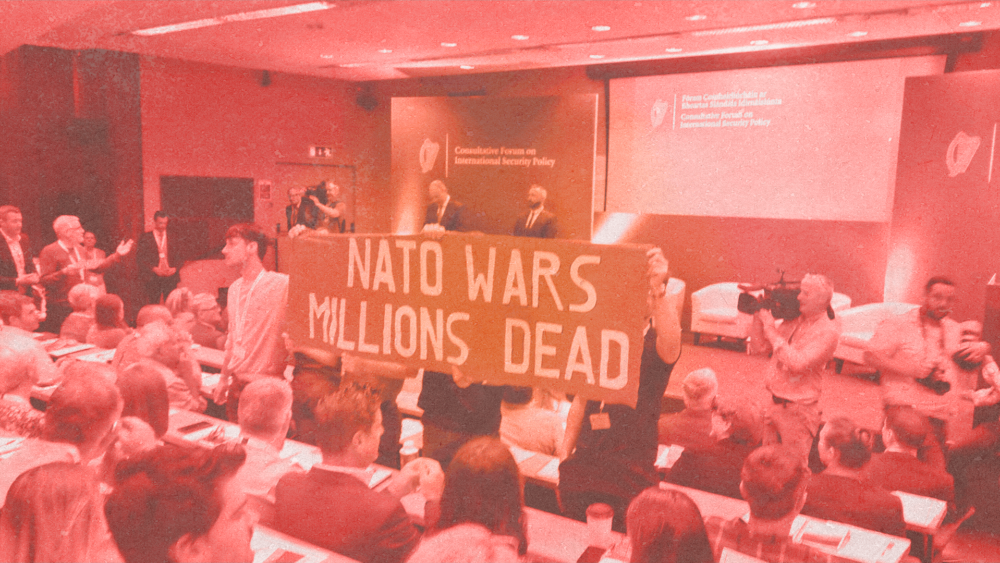The report from the Irish government’s Consultative Forum on International Security Policy has been published. Members of DiEM25 in Ireland Collectives presented a submission to the Forums held in June this year, in which we dealt with a number of aspects in relation to a public discourse on the role of Ireland in international affairs and the promotion of peace. These aspects included a policy of non-alignment with military blocs as proposed in the Athens Declaration, and the concept of ‘neutrality’ as integral in pursuing an independent and proactive approach for peace in the world.
While a conversation and discourse on the future of Irish foreign and defence policy ought to be welcomed owing to long-term neglect and the punitive role that the Irish public has in foreign policy formation, this should focus on the dangers of alignment with military blocs. In May 2022, Jeremy Corbyn, Ece Temelkuran and Yanis Varoufakis, on behalf of the Progressive International, DiEM25 and MeRA25 respectively, signed the Athens Declaration, which calls for a New Non-Aligned Movement. The Declaration recognises solidarity with the people of Ukraine and demands an immediate ceasefire to the war, the withdrawal of Russian forces from the country, and a comprehensive Peace Treaty guaranteed by the European Union, the United States and Russia in the context of the United Nations.
Due to the inability of any of these actors to support a ceasefire and, in Russia’s case to unilaterally declare one, whilst all responding to the Gaza war in the same vein, Russia, the US and collective defence alliances have shown themselves to be shallowly interested in geopolitical considerations over the interests of their own citizens and global humanity. Therefore, Ireland should abandon flirtation with expanded NATO collaboration and support lasting peace that can be achieved only by replacing military blocs with an inclusive international security framework that de-escalates tensions, expands freedoms, fights poverty, limits exploitation, pursues social and environmental justice and terminates the domination of one country by another.
The Non-Aligned Movement itself has been co-opted by governments that do not conform to the Cold War-era non-alignment that necessitated such a movement. These regimes project themselves as unified voices for the Global South in countries where militarised foreign policies are imposed onto the public by governments with little interest in their welfare. Therefore, we call upon democrats in Ireland and across the world to join forces in a New Non-Aligned Movement with non-aligned, democratic and sovereign countries working together for a just and lasting peace in a world that can avert climate catastrophe and bequeath to the next generation a decent chance at creating the conditions for globally shared prosperity.
What would joining a New Non-Aligned Movement look like for Ireland? Alongside entrenching neutrality in our Constitution, it can allow Ireland full flexibility to act as a progressive actor for peace. Recently, Ireland was able to defy EU and NATO member states that abstained or voted against a ceasefire in Gaza during the Jordan Resolution in the UN General Assembly. Since 1958, military non-alignment has allowed our Defence Forces to provide the world’s longest continuous service to mandated UN missions worldwide. These missions, sanctioned by the UN Security Council, Dáil Éireann and the government, offer Ireland perhaps the most democratic means anywhere in the world of approving troop deployments, a policy itself under threat through the government’s desire to remove the ‘Triple Lock’ mandate.
With Ireland’s history of conflict resolution and state building, we can bring extensive expertise to the global arena in mediating an end to conflicts, enforcing ceasefires and ensuring multilateral disarmament. A most important takeaway from the Consultative Forum report ought to be the conclusion that the concept of neutrality ‘remains popular in Ireland’ and that there exists an ‘absence of a popular mandate to drop the current policy of neutrality.’ The policy needs to be refined and elaborated upon in law, and instigating any policy discussions on Irish foreign and defence policy needs to ensure our democratic legitimacy and neutral identity are maintained and strengthened.
Do you want to be informed of DiEM25's actions? Sign up here















